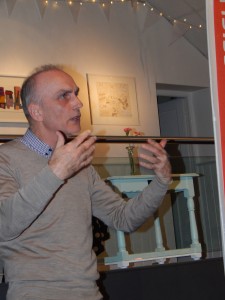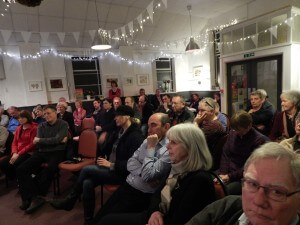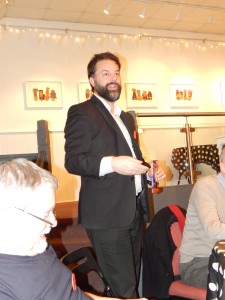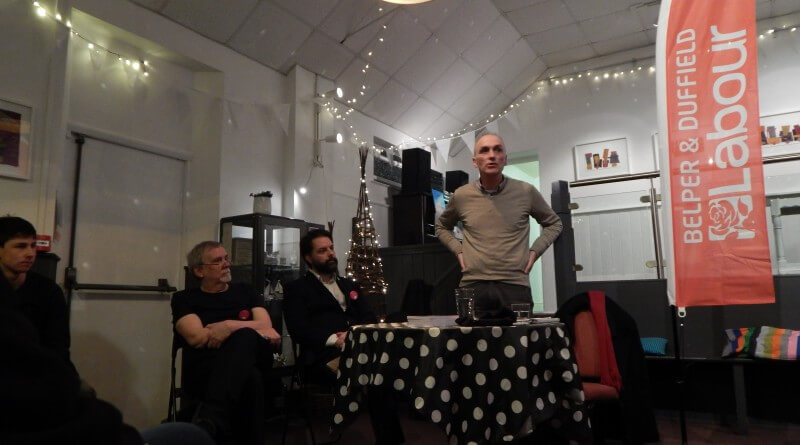Public Meeting: Labour’s Alternative to Austerity
On Wednesday 17th February at 7:30pm, Belper and Duffield Labour Party held a public meeting at No.28, Marketplace, Belper.
The Labour Party Spokespeople present were:
Carol Angharad – Belper & Duffield Labour
Chris Williamson – former MP Derby North, former union rep
Borough Council candidates for the next election Maurice Neville and Ben Bellamy
Despite the panel format, Chris Williamson was the only speaker and answered all questions asked by the audience.
 Chris Williamson talked about the exciting change in the Labour Party and in public discourse since Jeremy Corbyn took over as leader, stating that a great many people had responded against the neoliberal ideas of the Conservative Party that they now realise haven’t worked.
Chris Williamson talked about the exciting change in the Labour Party and in public discourse since Jeremy Corbyn took over as leader, stating that a great many people had responded against the neoliberal ideas of the Conservative Party that they now realise haven’t worked.
(Political vocabulary: neoliberal = American, noun, a modified form of liberalism tending to favour free-market capitalism. It is usually misused and much debated. It began as a battle of ideologies and new liberalism was to be based on the socialist ideas of Adam Smith. This was corrupted by economists like Milton Friedman into claiming that economic liberty safeguarded all freedoms, which is now clearly seen to be a lie. But still this economic idea of liberalism was intended to stand (in a very American sense) against tyrannical government. Now the accusation of being neoliberal is levelled AT tyrannical governments or indeed, at anyone espousing any ideas which the speaker does not agree with. In the context used here linguistically and in the context of anti-austerity, I believe that it is intended to mean the Conservative bias towards the rich and big business which is gutting our nation of its money, along with shifting financial responsibility and subsequent suffering onto British subjects.)
Chris Williamson wanted us to look at the idea of austerity. Austerity was the political reaction to the stock market crash and the consequence of austerity was the hardship of people coping without assistance from the state. This is the situation which led to world war two. In that situation, the thing that got the economy working and got people into work was British arms production. Tony Benn posited that if we can do it with arms then we can do it in peace, opposing the idea that austerity was ever necessary, let alone successful.
Although the mistakes that led to the crash preceding world war two were understandable to a degree, there is no such excuse for the crash of 2007/8 and despite reasonable excuses in the 1930s, austerity has never worked in any country that has reacted in such a fashion.
He spoke about neoliberal economics (unchecked profiteering, unpunished bankers and austerity). He used Latin America as an example of how it doesn’t work as politicians and businessmen think that it will work and illustrated that it always ends in suffering and greater socio-economic problems.
Mr. Williamson spoke of how a precedent for an alternative to austerity was set by the post-war Labour government, which founded our perception of the compassionate state that we now perceive as standard. This was broken by Thatcher (although was actually fought whilst being established, especially in regards to Bevan’s NHS, which only exists because of Bevan’s compromises).
He spoke of how neoliberalism has become the mainstream economic policy used across Europe and about how Greece broke this mould but were economically and psychologically tortured into accepting more austerity.
The breaking of the socialist model resulted in huge privatisation and indigenous industry skills were lost. There was an assault on trade unions, jobs were moved off shore, entire industries were destroyed and Britain put all its eggs into the financial market basket. In turn, the financial industry was undone by the crash in 2007, caused by huge deregulation of financial services, an escalating debt mountain and house price inflation. The days are now gone where people can aspire to own their own home.
Mr. Williamson stated that the neoliberal elite wore people down into thinking that there were no alternatives, despite the alternatives being apparent in recent history, within living memory.
In 2010, George Osborne, whose policies and decisions are a catastrophic failure even by his own measures, lost Britain’s triple A credit rating.
Who are these credit agencies? The same people who sold sub prime mortgages, sold on as investment opportunities and then wrote them off. The people we are trying to pay back are the same people who have caused the financial meltdown in the first place.
Osborne said he’d clear deficit – it has gone up.
Osborne said he’d get borrowing under control – it rose by trillions.
How can we define a decent society without decent public services? Services have been scaled back as councils that are not required by law to maintain them, close them. Libraries, buses, children’s centres, disabled services, street lights.
He mentioned David Cameron’s letter to Oxford Council complaining about cuts to illustrate the absurdity of the situation. There was laughter from the audience.
Mr. Williamson noted that the government hastily made £300m available to help. 83% of that emergency funding went to Conservative authorities. The Surrey stock broker belt got £23m. 18% of their income comes from government grants. In contrast, Derby City Council gets 70% of its funds from government grants. So Derby gets no Christmas lights but Surrey is secure. The difference of impact, especially on public services shows a naked political bias towards the rich.
Williamson says that Corbyn and McDonnell are beginning to set out how anti-austerity can work.
- Social Housing: At present the Conservatives are spending £25billion subsidising high rents through benefits. Only £9billion is invested in welfare housing. Housing is considered affordable if it is 80% of average in the area. We need a renaissance of social housing because private renting is becoming unaffordable. We are approaching the scale of need after WW2. He pointed out that building social homes creates jobs – builders, materials from UK, deliveries. And money spent inside the UK economy cycles round to work for us.
- Establishing a national investment bank: we need to make sure we have the money set aside to invest in our own infrastructure. This also creates jobs.
- Energy efficiency scheme: people are dying from the cold because they cannot afford heating. Scandinavia’s fuel bills a third of ours because of investment in insulation and installation of energy efficient technology and renewables. In turn, this increases job creation. Britain has a legal obligation to reduce emissions following the COP21 agreement and we can also reduce the demand for fuel by insulating.
- Stop offshoring. As a local example – Even Rolls Royce has done this. They announced thousands of job losses and then announced a Bangalore expansion and jobs were lost overseas. They claim £.5m grants for investment in research and development and we need to ensure the jobs created from that stay here in the UK.
- Clamping down on tax evasion – Google sweetheart deal to pay 3% tax rate is unacceptable.
- Corporate sector need to pay their way and contribute to a good society, as they benefit from it. .5% corporate tax would entirely pay for free higher education and a reintroduction of maintenance grants.
- Education. Don’t we want people to have a good education – engineers, architects, doctors, teachers? The consequence is that it puts off working class kids from going. Working class kids pay the fees (plus exreme interest), rich kids are paid for by parents.
- Reversing privatisation – ours rail fares are the highest in Europe, our rail system is owned by other nations, our rail fares are (allegedly) increased to subsidise the lower fares in other countries. Britain nearly lost Bombardier and our rail system due to contracts being given to foreign business.
- Need to go further than freezing energy prices. We need to nationalise energy. Rolls Royce came to Derby because of cheap energy. “Tories have centralised everything.” 50% of council income came from sale of energy. Public services define decent society and keep money in the real economy.
In France, IT equipment for the French parliament sustains an industry because they buy French. We need to do this. Buy British, sustain industries.
We have to contend with a mountain of debt and losses as a consequence of the financial crash. But there is a mirroring mountain of savings that could be used. Hundreds of trillions of dead money, festering in the bank accounts of the super rich and the corporate sector. The corporate sector and rich won’t invest because there is no demand. There is no demand due to no investment. So we need an interventionist government.
There is no evidence of banks investing their profits in the real economy. We need a different approach. We need to rebalance our economy to ensure that we are investing in real things that generate jobs and wealth for all.
Mr. Williamson repeatedly mentioned the hostility of national press and media towards the Labour party, stating that this makes it important to have public meetings and for the audiences to transmit the good, positive, realistic messages on social media. He suggested that everyone stop listening to the media. (As part of the media, we would suggest that there is a great deal more differentiation in the press than is suggested here and that the focus of this anger is the right wing gutter press. They are not the whole picture though.)
Throughout the talk, Mr. Williamson put too much emphasis on Greece as an example. Greece, despite some good philosophy and ideology, have failed to counter austerity and its people have suffered.
Mr. Williamson pointed out that in 2020 we will have the opportunity to vote for change.
(It should be noted that most of these ideas are not policy yet.)
 There then followed a question and answer session (all questions and answers are paraphrased):
There then followed a question and answer session (all questions and answers are paraphrased):
- 1) Mike Jones of Save The NHS
This isn’t a question but an observation, it’s about there being no alternative message. The semi-privatised NHS is hoovering up contracts and sending money offshore to tax havens. We really must get message across that this is happening and needn’t.
(no answer was required or response given)
2) Lady in front row: I have a 17 year old daughter with type 1 diabetes. 2 years ago she had to apply for PIP, it was a long battle and she hasn’t got it. She has 8 injections a day, my working family tax credits have stopped, I am living on £150 a week. They say that she has no more disability than any other 17 year old. I am wondering how, if Labour get in, what can we do for young people and those suffering criminal actions against them. Yes, criminal. I am so upset and frustrated. If taken to a court of law, would it be upheld just because they are the government? What will Labour do?
Mr. Williamson: Criminal. Shocking. We need a compassionate welfare state that works for people. Absolutely outrageous. It’s really important that you get representation. One thing I hope to do is launch the Derby Rights Organisation to help people like you.
Lady – there’s a difference in support in different areas. Someone else in another area would get treated entirely differently.
Williamson – we need to change the law.
Lady – I think it is evil.
Mr. Williamson – we all have to play our part.
3) A great thing the last Labour government did was introduce the minimum wage but it has now become a standard instead of a safeguard. From your perception, has their been a standardisation of minimum wage instead of it being a baseline to build on?
Mr. Williamson – The minimum wage is great. It was resisted by Tories. You are absolutely right. We now have a two tier society. It’s nowhere near enough. We should be aspiring to better. Jeremy Corbyn talked about £10ph. In Equador they have a dignity wage and if companies do not pay it then they cannot issue dividends to shareholders. It makes companies care about how employees treated. We are the 5th biggest economy in world; we should not be in this situation but there are so many things we need to change in order to achieve that better approach. The minimum wage is not enforced. We need to be resourcing HMRC to enforce the minimum wage and clamp down on tax evasion. But they have no workers. HMRC halved its work force. People are insecure, living on low wages. We need to lift industry, create jobs, housing etc.
4) Lady in second row: I believe that decent citizens should contribute more through taxes. Other countries have higher taxes. I think a lot of people support higher taxes. What is the Labour party’s view. Any country worth its salt provides for its weakest.
Mr. Williamson: Tax is seen as toxic but it pays for society – lights, police, education. We seem to have lost that argument. But what we are saying is not that we should raise tax for regular citizens but to focus on tax evaders and corporate tax and reverse millionaires tax cut but the key thing is growing the economy. Everyone is a tax payer – VAT, hits the poorest most and that needs to be addressed. We need a European protocol on corporation tax. It’s a scam. We need meaningful reforms.
The lady was vehement about people paying more tax and accused Mr. Williamson of dodging the question. He responded with a reasonable line that they wished to address this in other, more effective and fairer ways. The lady became increasing angry that her point was not accepted to the point of public spectacle.
Mr. Williamson: you have to win hearts and minds to win that argument. People in this country are struggling and its harsh to demand they pay more. We can fix the situation from the corporate angle and we may get to what you are demanding but not yet. It’s a big deal. We are already depicted as extremist on the corporation angle. We need to win that battle first.
5) Tony Webster
I’d like to ask about the neo-Keynesian approach. It’s a two part question.
1) What is your analysis of what went wrong?
2) the world has changed, global economy, neo-liberal economics, how do you apply Keynesianism in a neo-liberal market?
Mr. Williamson – the oil price quadrupled and the new right seized the opportunity, Thatcher came to power, condemned big government, there was the Axis of Evil – Thatcher/Reagan, so nothing went wrong with that and it is one of the reasons that we should vote to stay in the EU.
Movement across Europe to democratise Europe and make it work for ordinary people. Repeats self on Rolls Royce.
Mr. Webster – Interesting – Greece was stopped by the EU. I do wonder what a European perspective on Keynsian economics would be.
Mr. Williamson – It would reject it.
Mr. Webster – So would we be better off outside Europe?
Mr. Williamson – Well we are outside the Euro and have a national bank.
Mr. Webster raised the issue of TTIP and questioned if economic suggestions could work under it.
Mr. Williamson – TTIP is secret and needs to be transparent. We need to work with colleagues across Europe to make this happen. (Mr. Williamson) mentioned Greece again – says they didn’t need to capitulate. If we come out then we’ll have to deal with that.
6) Leon who is a former Liberal
Are you preaching to the choir? The audience is older here, are they already converted?
I’m in limbo between Labour and Green. How are you going to get younger people on side, as they will turn the tide at the next election? There are no young people here.
(Leon is not youth and my 17 year old son is sat next to me).
Mr. Williamson – We do need to reach out to the people who didn’t vote. It will get more difficult to register under the new system. (Repeats self. Attacks media again.)
Lots of young people involved. Lots joined. Teenagers tried to break in to hear Jeremy Corbyn. Public meetings is one way. I take your point. >invited Leon to speak to local councillors and advise on this issue.
7) Sue MacFarlane – Green Party
Your policies and attitudes match Green, so we are not at odds. Corbyn has difficulty with getting people even within his own party to agree to changing policy. I can’t see that he will become PM because he isn’t converting people. He is struggling to make changes within his own party. How is he going to make it happen? How are these beliefs going to become Labour party policies? Needs to be on a national level. Parliamentary Labour party aren’t listening.
Mr. Williamson- Jeremy Corbyn’s core values are core values of the Labour Party and parliamentary Labour were out of sync with the people. Membership and interest had soured. That is picking up again now. I am convinced we will see these as policies. He is not out of sync with the party, only some party leadership. Disruption has been overstated. The media are not sympathetic. I have never known the Labour party to be so united and I have no doubt that Jeremy Corbyn’s core agenda will be adopted as policy.
8)We tend to talk about business as one body but there are big and small. Would you say that Tories are big business and bad for small businesses?
Small businesses have faired poorly under Tories and freelancers are in poverty.
Small businesses get no benefits as they are deemed self employed. Labour For Small Businesses is addressing this issue. We must grow the economy to benefit small businesses. Government procurement potential can benefit and protect small businesses.
9) if Trident was used would it be a war crime. Jeremy Corbyn wouldn’t use it. If it is illegal under international law then it isn’t a deterrent anyway. Jeremy Corbyn should be praised.
Mr. Williamson – Yes. It’s a no brainer. There is a jobs issue and we need to address that. A defence diversification agency would ensure jobs for trident staff in high tech industries.
Alternative products are highly plausible. We can generate three times the number of jobs that would be lost in Trident. It would be a crime against humanity and destroy us with a nuclear winter.
10) How do we pay off the national debt?
Mr. Williamson – Get more people in work, taxes and economic improvement will improve the debt.
(there was a lot of public noise creating confusion and people were waffling unproductively)
Me: Should the question be… do we need to pay off the national debt? Iceland chose not to.
Mr. Williamson – I think we can deal with it without being that radical.
11) If we get the economy working and fair and sustainable then we need to talk about a new compassionate inclusive consulting system for government. Why are we not talking about proportional representation as part of Labour policy?
We need it but we first need a government who are open to electoral reform. More and more people are in favour of it. We can’t lose touch with the electorate. But the next election will be first past the post.
It is not a burning issue, although important. It isn’t the most crucial bread and butter issue that resonates with people most. We need to find the right mechanism to discuss that, as there is a growing level of support. If you support it from inside the labour party then you’ll get it further along. Join the Labour party and raise it.
Carol Angharad closes the meeting – “We need great change.” This is the first of many meetings we intend to hold over the first few years. The next is defence. Members can contribute to that discussion online first.
 Ben Bellamy, Labour candidate for Borough Council thanked Chris Williamson. He promoted Chris’ book. He urged people to join the party and gave details of where to apply for party membership.
Ben Bellamy, Labour candidate for Borough Council thanked Chris Williamson. He promoted Chris’ book. He urged people to join the party and gave details of where to apply for party membership.
There was a busker outside the hall on the way out collecting donations to cover the cost of hall hire.


A fair report. I would have to disagree with Clare’s notions of media differentiation though. Thorough surveys of press and other media consistently demonstrate the massive bias against any ‘left wing’ ideas or organisations, let alone the Labour Party. It isn’t just the gutter press which is owned by the likes of the loathsome Rupert Murdoch, the concentration of media ownership extends to the broadsheets, TV, online and local press. Even the BBC has a strong tendency to follow the lead of the right wing press, right wing think tanks and right wing commentariat from day to day, especially as their own news budget is progressively and deliberately degraded by the Government.
Hello Maurice. They are not notions. It’s something I’ve been deliberately paying attention to and although there were a few weeks of Corbyn mocking, there is a shift occuring, if you pay attention. There are many news sources which are liberal and pro-people and although they do not support a party (and they shouldn’t, no journalism should be uncritically applauding anyone), they don’t oppose in the way that is being suggested.
There are deep problems with sections of the media, big corporations and government funded especially (although Channel 4 seem to be a better televisual source than others despite funding). The issues with the BBC are entirely different to those of say, The Sun and The Daily Mail.
Please send me your surveys so that I can compare them to my own research and investigate the sources and funding of them.